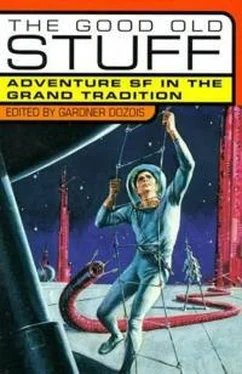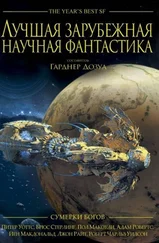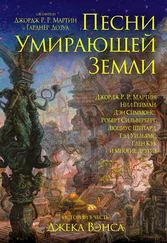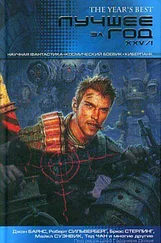Гарднер Дозуа - The Good Old Stuff
Здесь есть возможность читать онлайн «Гарднер Дозуа - The Good Old Stuff» весь текст электронной книги совершенно бесплатно (целиком полную версию без сокращений). В некоторых случаях можно слушать аудио, скачать через торрент в формате fb2 и присутствует краткое содержание. Год выпуска: 1998, ISBN: 1998, Издательство: St. Martin's Griffin, Жанр: Фантастика и фэнтези, на английском языке. Описание произведения, (предисловие) а так же отзывы посетителей доступны на портале библиотеки ЛибКат.
- Название:The Good Old Stuff
- Автор:
- Издательство:St. Martin's Griffin
- Жанр:
- Год:1998
- ISBN:0-312-19275-4
- Рейтинг книги:3 / 5. Голосов: 1
-
Избранное:Добавить в избранное
- Отзывы:
-
Ваша оценка:
- 60
- 1
- 2
- 3
- 4
- 5
The Good Old Stuff: краткое содержание, описание и аннотация
Предлагаем к чтению аннотацию, описание, краткое содержание или предисловие (зависит от того, что написал сам автор книги «The Good Old Stuff»). Если вы не нашли необходимую информацию о книге — напишите в комментариях, мы постараемся отыскать её.
The Good Old Stuff — читать онлайн бесплатно полную книгу (весь текст) целиком
Ниже представлен текст книги, разбитый по страницам. Система сохранения места последней прочитанной страницы, позволяет с удобством читать онлайн бесплатно книгу «The Good Old Stuff», без необходимости каждый раз заново искать на чём Вы остановились. Поставьте закладку, и сможете в любой момент перейти на страницу, на которой закончили чтение.
Интервал:
Закладка:
He groaned as he pictured it destroyed in one burst of intolerable flame. And then there was no time for thought of anguish.
A third warship came into view, but, as Jamieson strained to make out its contours, it turned and fled.
His wrist radio clicked on. “Cannot help you now. Save yourself. Our four accompanying battleships and attendant squadrons will engage the Rull fleet, and try to draw them toward our larger battle group cruising near the star, Bianca, and then re—” A flash of fire in the distant sky ended the message. It was a full minute before the cold air of Laertes III echoed to the remote burst of the broadside.
The sound died slowly, reluctantly, as if little overtones of it were clinging to each molecule of air. The silence that settled finally was, strangely, not peaceful, but a fateful, quiescent stillness, alive with unmeasurable threat.
Shakily, Jamieson climbed to his feet. It was time to assess the immediate danger that had befallen him. The greater danger he dared not even think about. He headed first for his lifeboat. He didn’t have to go all the way. The entire section of the cliff had been sheared away. Of the ship, there was no sign. He had expected it, but the shock of the reality was numbing. He crouched like an animal and stared up into the sky. Not a movement was there, not a sound came out of it, except the sound of the east wind. He was alone in a universe between heaven and earth, a human being poised at the edge of an abyss.
Into his mind, tensely waiting, pierced a sharp understanding. The Rull ships had flown once over the mountain to size up the situation on the tableland and then had tried to destroy him. Equally disturbing and puzzling was the realization that battleships of the latest design were taking risks to defend his opponent on this isolated mountain.
He’d have to hurry. At any moment they might risk one of their destroyers in a rescue landing. As he ran, he felt himself one with the wind. He knew that feeling, that sense of returning primitiveness during moments of excitement. It was like that in battles, and the important thing was to yield one’s whole body and soul to it. There was no such thing as fighting efficiently with half your mind or half your body. All was demanded.
He expected falls, and he had them. Each time he got up, almost unaware of the pain, and ran on again. He arrived bleeding, almost oblivious to a dozen cuts. And the sky remained silent.
From the shelter of a line of brush, he peered at the Rull. The captive Rull, his Rull to do with as he pleased. To watch, to force, to educate—the fastest education in the history of the world. There wasn’t any time for a leisurely exchange of information. From where he lay, he manipulated the controls of the screen.
The Rull had been moving back and forth in front of the screen. Now it speeded up, then slowed, then speeded up again, according to his will.
Nearly a thousand years before, in the twentieth century, the classic and timeless investigation had been made of which this was one end result. A man called Pavlov fed a laboratory dog at regular intervals, to the accompaniment of the ringing of a bell.
Soon the dog’s digestive system responded as readily to the ringing of the bell without the food as to the food and the bell together. Pavlov himself did not, until late in his life, realize the most important reality behind his conditioning process. But what began on that remote day ended with a science that could brainwash animals and aliens—and men—almost at will. Only the Rulls baffled the master experimenters in the later centuries when it was an exact science.
Defeated by the will to death of a ll the Rull captives, the scientists foresaw the doom of Earth’s galactic empire unless some beginning could be made in penetrating the minds of Rulls. It was his desperate bad luck that he had no time for penetrations. There was death here for those who lingered.
But even the bare minimum of what he had to do would take time. Back and forth, back and forth; the rhythm of obedience had to be established. The image of the Rull on the screen was as lifelike as the original. It was three-dimensional, and its movement s were like those of an automaton: Basic nerve centers were affected. The Rull could no more help falling into step than it could resist the call of the food impulse. After it had followed that mindless pattern for fifteen minutes, changing pace at his d direction, Jamieson started the Rull and its image climbing trees. Up, then down again, half a dozen times. At that point, Jamieson introduced an image of himself.
Tensely, with one eye on the sky and one on the scene before him, he watched the reactions of the Rull. When, after a few minutes, he substituted himself for his image, he was satisfied that this Rull had temporarily lost its normal hate and suicide conditioning when it saw a human being.
Now that he had reached the stage of final control, he hesitated. It was time to make his tests. Could he afford the time? He realized that he had to. This opportunity might not occur again in a hundred years.
When he finished the tests twenty-five minutes later, he was pale with excitement. He thought, This is it. We’ve got it. He spent ten precious minutes broadcasting his discovery by means of his wrist radio—hoping that the transmitter on his lifeboat had survived its fall down the mountain—and was rebroadcasting the message out through subspace. There was not a single answer to his call, however, during the entire ten minutes.
Aware that he had done what he could, Jamieson headed for the cliff’s edge he had selected as a starting point. He looked down and shuddered, then remembered what the Orion had said: “An entire Rull fleet cruising ...”
Hurry!
He lowered the Rull to the first ledge. A moment later he fastened the harness around his own body and stepped into space. Sedately, with easy strength, the RUll gripped the other end of the rope and lowered him down to the ledge beside it. They continue d on down and down. It was hard work although they used a very simple system. A long plastic line spanned the spaces for them. A metal climbing rod held position after position while the rope did its work.
On each ledge, Jamieson burned the rod at a downward slant into solid rock. The rope slid through an arrangement of pulleys in the metal as the Rull and he, in turn, lowered to ledges farther down. The moment they were both safely in the clear of one ledge Jamieson would explode the rod out of the rock, and it would drop down ready for use again.
The day sank toward darkness like a restless man into sleep.
Jamieson’s whole being filled with the melancholy of the fatigue that dragged at his muscles.
He could see that the Rull was growing more aware of him. It still cooperated, but it watched him with intent eyes each time it swung him down. The conditioned state was ending. The RUll was emerging from its trance. The process should be complete before night.
There was a time, then, when Jamieson despaired of getting down before the shadows fell. He had chosen the western, sunny side for that fantastic descent down a sheer, brown and black cliff like no other in the known words of space. He watched the Rull with quick, nervous glances during the moments when they were together on a ledge.
At 4:00 P.m. Jamieson had to pause again for a rest. He walked to the side of the ledge away from the Rull and sank down on a rock. The sky was silent and windless now, a curtain drawn across the black space above, concealing what must already be the greatest Rull-human battle in ten years. It was a tribute to the five Earth battleships that no Rull ship had yet attempted to rescue the Rull on the tableland.
Possibly, of course, they didn’t want to give away the presence of one of their own kind.
Читать дальшеИнтервал:
Закладка:
Похожие книги на «The Good Old Stuff»
Представляем Вашему вниманию похожие книги на «The Good Old Stuff» списком для выбора. Мы отобрали схожую по названию и смыслу литературу в надежде предоставить читателям больше вариантов отыскать новые, интересные, ещё непрочитанные произведения.
Обсуждение, отзывы о книге «The Good Old Stuff» и просто собственные мнения читателей. Оставьте ваши комментарии, напишите, что Вы думаете о произведении, его смысле или главных героях. Укажите что конкретно понравилось, а что нет, и почему Вы так считаете.












